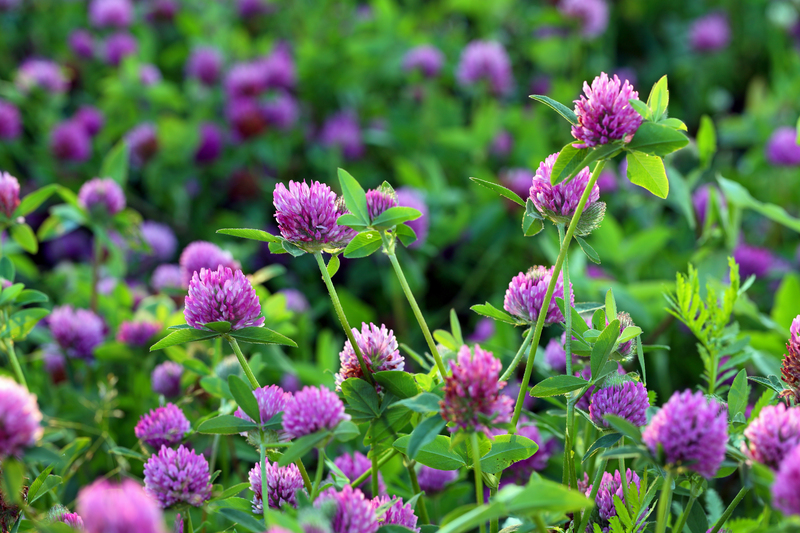9 Foundational Tips to Cultivate Your Gardening Skills
Posted on 29/05/2025
9 Foundational Tips to Cultivate Your Gardening Skills
Ready to nurture your green thumb and elevate your gardening expertise? Whether you're a complete beginner or simply aiming to sharpen your horticultural know-how, consistent practice and the right guidance can help you develop exceptional gardening skills. In this comprehensive article, we'll walk you through 9 foundational tips that can transform the way you garden--making it more rewarding, sustainable, and productive.

Why Mastering the Basics of Gardening Is Important
Before diving into planting, pruning, and harvesting, it's essential to understand the value of strong foundations. Gardening expertise is built layer by layer, starting with knowledge of climate, soil, and proper techniques. Establishing solid groundwork ensures you avoid costly mistakes, save time, and cultivate thriving gardens--no matter your location or experience level.
Table of Contents
- Understand Your Local Environment
- Choose Suitable Plants For Your Region
- Learn the Art of Soil Preparation
- Master the Basics of Watering
- Use Mulching Effectively
- Practice Pruning and Deadheading
- Monitor and Manage Pests Sustainably
- Embrace Seasonal Gardening Tasks
- Keep Learning and Connecting with Other Gardeners
1. Understand Your Local Environment
Every thriving garden begins with a deep knowledge of your unique environment. Successful gardening isn't about copying beautiful designs from magazines; it's about working harmoniously with the conditions you have.
- Climate: Know whether you're in a tropical, temperate, arid, or cold region. This determines your growing seasons and suitable plant varieties.
- Soil Type: Is your soil sandy, clay, loamy, or silt? Each soil type affects water drainage, nutrient availability, and plant selection.
- Light Exposure: Map out shaded and sunlit areas in your garden over the course of a day to decide where to place plants with different light requirements.
Tip: Connect with local gardening clubs or extension services. Local knowledge is invaluable and can save you years of trial and error.
2. Choose Suitable Plants For Your Region
The key to growing a flourishing garden lies in selecting plants adapted to your area's climate, soil, and available sunlight. This minimizes maintenance and maximizes the health and beauty of your plants.
- Research native species: Native plants naturally thrive in your region's conditions, attracting pollinators and requiring less care.
- Pay attention to plant hardiness zones: Most plant labels or seed packets indicate suitable USDA Hardiness Zones.
- Consider microclimates: Wind-protected corners or sunny walls may allow you to grow a wider variety of plants.
Choosing the right plants is one of the foundational skills every gardener should develop to ensure long-term success.
3. Learn the Art of Soil Preparation
The phrase "You're only as good as your soil" is a golden rule in gardening. Healthy soil is the secret ingredient behind robust plants, bountiful harvests, and colorful blooms.
- Test your soil: Send a soil sample to a lab or use a kit to assess pH, nutrient levels, and texture.
- Amend as needed: Improve poor soil with compost, organic matter, or gypsum for clay, and sand for heavy loam--never underestimate the value of good compost!
- Till with caution: Over-tilling can damage soil structure and beneficial organisms. Opt for no-dig methods where possible.
Gardening mastery begins with nurturing your soil, so make it a priority!
4. Master the Basics of Watering
Water is life for your garden, but too much or too little can be detrimental. Knowing when and how to water separates beginners from skilled gardeners.
- Water deeply but infrequently: Encourage roots to grow deeper by soaking soil rather than sprinkling frequently.
- Water early or late in the day: Reduce evaporation and prevent leaf burns by watering before 10 a.m. or after 4 p.m.
- Adapt to plant needs: Some plants, like succulents or Mediterranean herbs, need less water than vegetables or annual flowers.
Consistent watering is fundamental for garden productivity and plant health.
5. Use Mulching Effectively
Mulching is a game-changer for maintaining soil health, conserving moisture, and keeping weeds at bay. Effective mulching also creates a tidy, attractive garden.
- Organic mulch: Straw, wood chips, leaves, or grass clippings slowly enrich soil as they decompose.
- Inorganic mulch: Stones or landscape fabric are useful for permanent pathways but don't add nutrients.
- Apply at the right thickness: 2-4 inches is ideal; too little won't suppress weeds, too much can hinder water penetration.
Mulching is a core gardening skill that helps both novice and expert gardeners maintain vibrant, sustainable gardens.
6. Practice Pruning and Deadheading
Regular pruning, deadheading, and thinning are essential to promote healthy growth, shape plants, and optimize flowering or fruiting.
- Prune at the right time: Winter for trees and many shrubs, after flowering for spring bloomers.
- Use clean, sharp tools: Prevent disease spread and ensure cleaner cuts for faster healing.
- Deadhead spent flowers: This encourages continuous blooming and redirects energy to the healthiest growth.
Developing gardening skills like precision pruning can make a dramatic difference in your landscape's appearance and plant health.
7. Monitor and Manage Pests Sustainably
Pest management is a crucial part of gardening expertise. Your goal is to control harmful insects or diseases without upsetting the natural balance of your garden.
- Identify pests accurately: Know the difference between 'bad bugs' and beneficial insects that help control problems.
- Encourage biodiversity: Companion planting and pollinator-friendly gardens strengthen your plants' natural defenses.
- Opt for integrated pest management (IPM): Use barriers, hand-picking, traps, and neem oil before resorting to chemical solutions.
Gardening wisdom means allowing nature to help you create a self-balancing eco-system, reducing your reliance on pesticides.
8. Embrace Seasonal Gardening Tasks
Each season brings its own set of tasks for garden cultivation and improvement. Planning and adjusting to nature's rhythms is a foundational gardening skill.
- Spring: Start seeds, plant cool-weather vegetables, apply fresh mulch, prune certain shrubs.
- Summer: Maintain weeding, continue watering, deadhead flowers, monitor for pests.
- Autumn: Plant perennials, add compost to beds, collect fallen leaves for mulch, divide and transplant bulbs.
- Winter: Protect tender plants, clean and sharpen tools, plan next year's garden, order seeds.
Adapting your care routine through the year is essential for advancing your gardening expertise and achieving year-round beauty.
9. Keep Learning and Connecting with Other Gardeners
Finally, remember that gardening is a lifelong journey--there's always room to grow! Staying informed and networking with fellow enthusiasts keeps your skills sharp and your passion ignited.
- Read gardening books and blogs: Reliable sources keep you updated with latest techniques and trends.
- Join local workshops or garden clubs: Hands-on experience and shared wisdom are invaluable.
- Document your successes and failures: Keep a garden journal to refine your practices year after year.
Gardening mastery is built through curiosity, connection, and continuous effort.

Bonus Tips to Accelerate Your Gardening Progress
- Start Small: A contained raised bed or window box lets you learn key skills without becoming overwhelmed.
- Invest in Quality Tools: Good tools last longer and make gardening less of a chore.
- Be Patient and Observant: Nature works on her own timeline--learn to watch, wait, and celebrate small victories.
Conclusion: Grow Your Gardening Skills with Confidence
Embarking on your gardening journey can be one of the most fulfilling decisions you ever make. These 9 foundational tips offer a roadmap to develop your gardening skills, ensuring your plants--and your gardening confidence--flourish with each passing season. Remember, mastering the art of gardening is a blend of knowledge, observation, persistence, and joy. Whether you're growing food or flowers, your efforts will be rewarded not just with healthy plants but with a healthier, happier you.
Ready to dig in? Commit to these gardening fundamentals, connect with your local gardening community, and keep nurturing both your soil--and your skills. Happy gardening!

